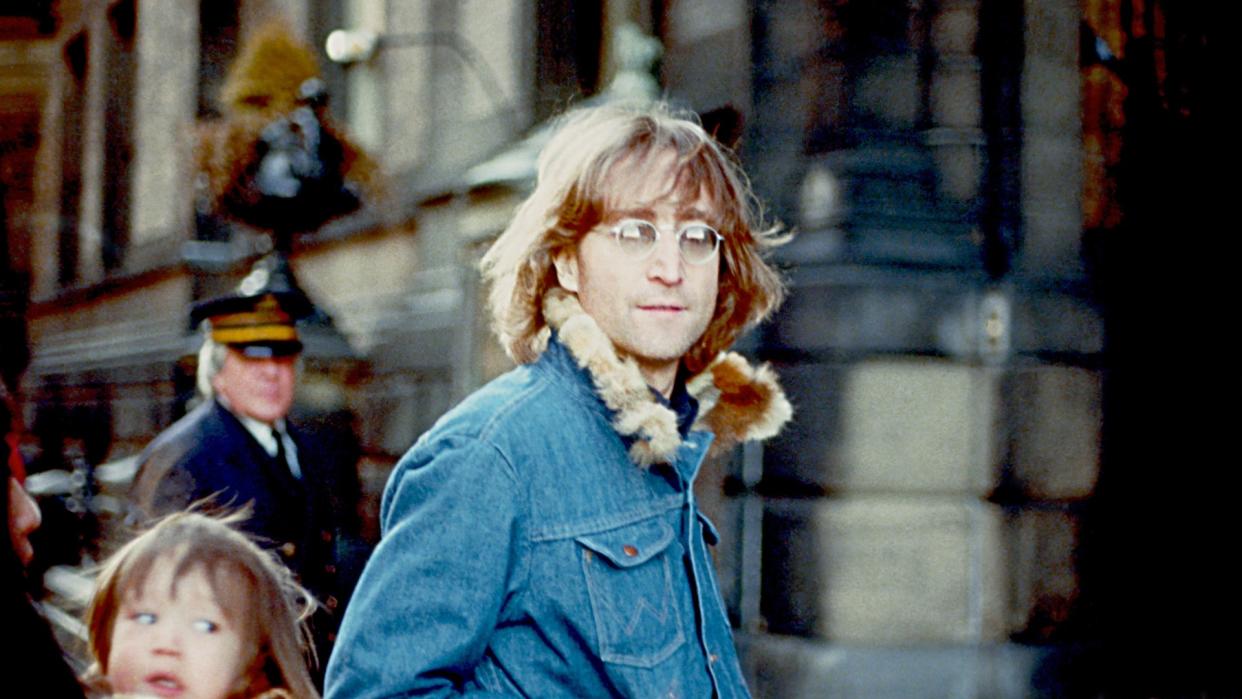John Lennon: shocking murder re-examined in TV documentary

- Oops!Something went wrong.Please try again later.
- Oops!Something went wrong.Please try again later.
For many people, John Lennon's assassination in 1980 was one of the few "where were you?" moments, ranking alongside the deaths of John F. Kennedy and Princess Diana, and 9/11.
Unlike the murder of JFK, there is no debate about who shot the former Beatle. There has, though, always been a fascination over why.
Now a new three-part documentary narrated by Kiefer Sutherland, "John Lennon: Murder Without a Trial", offers what Apple TV+ calls "shocking details" of the fateful day including never-before-heard eyewitness accounts, first-hand testimonies and an exhaustive look at the motivations and mental state of the man who killed him.
The background
Lennon was murdered on the evening of 8 December 1980 outside the glamorous Dakota building on New York's Upper West Side, where the 40-year-old musician lived with his wife, Yoko Ono, and their young son, Sean Ono Lennon.
Mark David Chapman, 25, who fired five shots at the former Beatle as he was entering the building, was obsessed with Lennon but had become increasingly incensed by his lifestyle and public stances. He closely identified with Holden Caulfield, the hero of counter-culture bible "Catcher in the Rye", and when later asked by his lawyers why he had done it, repeated a famous saying from the book.
Referring to the Beatles song he said, "'All You Need Is Love', have you ever heard that? Well, this is what I say to that: all you need is love and 250 million dollars. He was the biggest, phoniest bastard that ever lived."
With plenty of eyewitnesses, Chapman was immediately apprehended and his guilty plea landed him a 20 years-to-life sentence at the Green Haven Correctional Facility, 65 miles north of the city, where he remains to this day. This presented the makers of "John Lennon: Murder Without a Trial" with "an unfamiliar challenge in its seeming straightforwardness", said The Guardian's Charles Bramesco.
The latest
Rather than focus on one of the most famous figures of the 20th century, the three episodes shift attention from Lennon to "construct an exhaustively detailed profile of Chapman, whose inscrutable motivations confounded and fascinated" the filmmakers, Bramesco said. The co-directors Rob Coldstream and Nick Holt reasoned that they would "break new ground on the subject by privileging depth over breadth".
There have been countless documentaries and films made about the assassination but the latest is "remarkable to listen to" because the first-hand accounts are "so vivid and detailed despite the passage of more than 40 years", agreed The Telegraph's arts and entertainment editor Anita Singh. "There is a danger that documentaries like these can be little more than true-crime titillation," she said, "but here there is a sense that those present wanted history to be recorded."
Some, such as the Dakota concierge Jay Hastings who reveals Lennon's final words, have never spoken publicly before. Also telling their story for the first time are Richard Peterson, a cab driver who witnessed the shooting, and Dr Naomi Goldstein, the psychiatrist who assessed Chapman. There are also interviews with police officers who were first on the scene, as well as lead detectives and Chapman's lawyer, who argued the case for an insanity plea.
"Strangest of all," said the Daily Mail, the documentary features Chapman himself, in previously unheard recordings made under hypnosis in prison. He gives various explanations as to why he did it while reliving the moment of the murder, which "feels eerily like seeing the killing itself".
One person who is conspicuous by her absence, however, is Yoko Ono. "It is never explained" if Lennon's wife, now 90 years old, "was asked or declined to appear" in the documentary, said The Telegraph.
The reaction
"The production was granted extensive Freedom of Information Act requests from the New York City Police Department, the Board of Parole, and the District Attorney’s office," said IndieWire. Combined with new testimonies, the new information makes this the "definitive documentary" about the assassination and its aftermath, said Rolling Stone.
The filmmakers have stressed they took particular pains "not to sensationalize the story" out of respect to Lennon's surviving family. But there is one count on which the documentary feels on "shaky ground", said Singh in The Telegraph: "its toying with conspiracy theories".
It has long been known that Lennon was considered a threat to the FBI because of his anti-war activities, and the theory that Chapman had been under the influence of MK-Ultra mind control has been around for decades. "But the way these things are addressed – and conspiracy is trailed in the opening minutes – adds a slightly sensationalist tone, and the theories are soon cast aside without thought," Singh concluded.
"John Lennon: Murder Without a Trial" is available on Apple TV+ from 6 December

